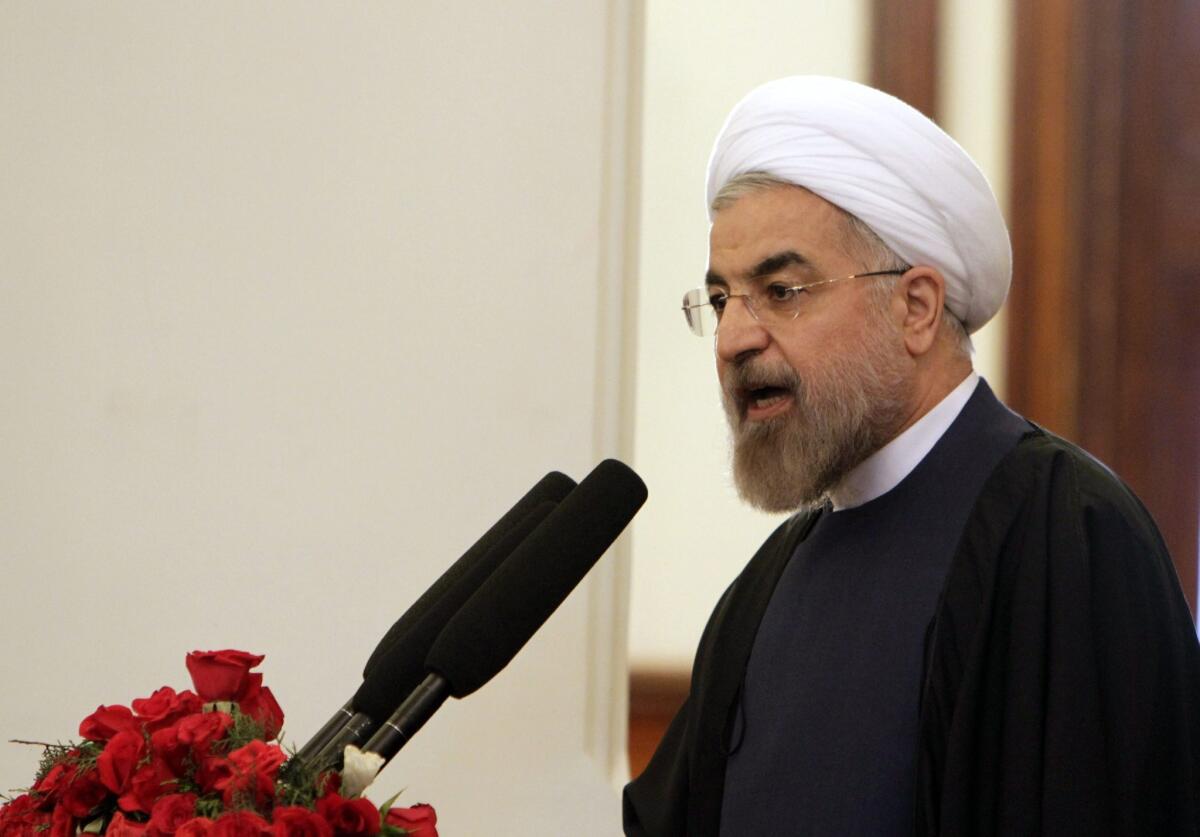Hassan Rouhani clashes with Iranian conservatives over nuclear talks

- Share via
Reporting from Tehran — The war of words between Iranian President Hassan Rouhani and his conservative critics is escalating as nuclear talks between Tehran and world powers are set to enter a potentially decisive phase next week.
The president and his supporters came out swinging Monday following a concerted campaign by hard-liners voicing “deep concern” that Rouhani may be prepared to scrap Iran’s nuclear program in exchange for relief from international economic sanctions. The president’s allies accused conservatives of engaging in scare tactics designed to undermine Rouhani’s leadership and scuttle the nuclear talks.
“Why were the critics who now express such ‘deep concern’ mute when the economic growth was negative ... and the unemployment rate was 12.2% ... and corruption was soaring,” Davoud Mohammadi, chief editor of the reformist Shargh daily, asked in an editorial assailing supporters of Rouhani’s hard-line predecessor, Mahmoud Ahmadinejad, who resisted nuclear compromise with the West.
Rouhani himself was quoted in reformist publications as asking, “Those who are for the continuation of sanctions, please give their reasons.”
The president denies that his negotiating team is willing to dismantle all of Iran’s nuclear projects. Rather, the government says, it will agree to certain constraints ensuring the program is strictly for peaceful purposes, in exchange for relief from sanctions.
“Iran does not compromise on the people’s interests,” Rouhani told state television last week.
On Saturday, critics of Rouhani chose a provocative venue -- the former U.S. Embassy, now a stronghold of hard-line activists -- to host a forum under the slogan, “We’re Worried.”
“If we give [nuclear technology] up for nothing, then for one hundred years we have sold out the interests of our children and grandchildren,” Fereydoun Abassi, the former head of Iran’s nuclear agency, told about 200 people gathered at the “den of espionage,” where anti-U.S. slogans adorn the walls and corridors.
Other speakers accused the West of treachery at the nuclear talks.
“The nuclear issue is a pretext to harness and contain Iran,” a conservative professor, Fouad Eyzadi, told the crowd, which responded with a fists-raised chant: “Death to the compromisers!”
Economic penalties tied to Iran’s nuclear program have battered the country’s economy. Rouhani, who took office last year, has made sanctions relief a centerpiece of his economic strategy.
Iran maintains that its nuclear program is for peaceful purposes, such as power generation, and rejects Western and Israeli suspicions that it seeks atomic weapons capability.
The president’s backers accuse many of his critics of being sanctions profiteers resisting an end to the bonanza.
“Hard-liners are trying to conceal the reality that corruption due to chronic sanctions made them the new rich of society,” Saeed Laylaz, an economist close to Rouhani, said in an interview. “They do not want the sanctions to be lifted and for a transparent economy to prevail.”
Debate about the nuclear negotiations is intensifying here as Iran and the so-called P5+1 group of world powers -- the United States, Russia, China, Britain, France and Germany -- are set to resume talks in Vienna on May 13.
Negotiators are reported to be poised to begin preparing the final draft of a proposed comprehensive nuclear deal, advancing an interim accord worked out last year.
The two sides have set a July 20 deadline for reaching a final agreement, though that date could be extended by six months. Both sides have cautioned that tough negotiations lie ahead before any permanent resolution of the impasse between the West and Iran on Tehran’s nuclear efforts.
“Obviously, Rouhani is feeling a lot of pressure on the nuclear issue,” said Javad Shayestemehr, an independent analyst and university instructor. “He is doing everything he can to assure the public that the deal will not be a sellout to the West.”
Special correspondent Mostaghim reported from Tehran and staff writer McDonnell from Beirut.
More to Read
Sign up for Essential California
The most important California stories and recommendations in your inbox every morning.
You may occasionally receive promotional content from the Los Angeles Times.













